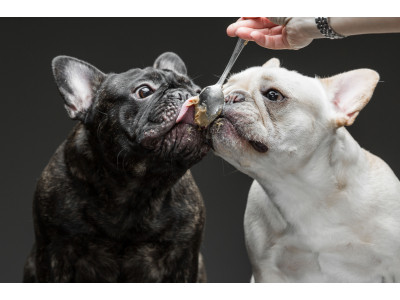An Apple a Day: Exploring the Tasty Relationship Between French Bulldogs and Apples

Apples have earned their reputation as one of the most popular and beloved fruits among humans. Their crisp texture and sweet, refreshing taste make them a favorite snack choice for people seeking a healthy and nutritious option. However, when it comes to our furry companions, such as dogs, it's natural to wonder if these delightful fruits can be incorporated into their diets and whether they offer any benefits to our four-legged friends.
This article aims to delve into the fascinating world of how fruits, particularly apples, can impact a Frenchie's body and overall health. We will explore the potential advantages of including apples in your canine companion's diet and provide essential guidelines on how to offer them in a manner which ensures both safety and nutritional value. If you've ever pondered whether your French Bulldog can share in your love for apples, read on to discover the answers and learn how to do it the right way.
Apples and all their benefits
Apples are far more than simply a delicious and crisp snack; they are a powerhouse of nutrients that can have a profound impact on an animal's overall health. One of the remarkable advantages of incorporating apples into a French Bulldog's diet is their rich fiber content, playing a pivotal role in fostering a healthy microflora within the gastrointestinal tract. This fiber, primarily in the form of pectin, not only aids digestion but also helps maintain the optimal balance of beneficial intestinal bacteria promoting digestive well-being.

This fruit also contributes to enhancing the immune system's robustness, which in turn reduces the likelihood of your furry companion falling prey to various illnesses. This immune-boosting quality is attributed to the array of nutrients found in apples, including carotene, food acids, essential oils, and mineral salts such as calcium, iron, and phosphorus, all of which are essential for the body's proper functioning.
Additional plus
Apples also function as natural absorbers, facilitating the elimination of toxins and waste substances from the body, thereby contributing significantly to the process of detoxification. Moreover, tart apple varieties boast a notable abundance of essential iron and copper salts, which play a crucial role in supporting robust blood health and metabolic processes.
Thus, it becomes evident that apples are not merely a delectable and gratifying treat for your cherished pet but also present a plethora of health advantages that can help your furry companion maintain optimal well-being and vitality.
What you need to know when introducing apples into your French Bulldog’s diet
When considering the inclusion of fruits in your pet's diet, it's a wise choice to prioritize locally sourced varieties. Local fruits often have the advantage of containing fewer chemical residues, making them a safer option for your furry friend. By opting for these locally grown varieties, you can minimize the potential risks associated with pesticide exposure and other harmful chemicals that might be present in imported or non-local fruits.
The significance of introducing fruits into a puppy's diet cannot be overstated, as it plays a crucial role in establishing healthy digestion from an early age. An excellent starting point for complementary food for puppies is a blend of mashed apples and carrots. This combination not only provides essential vitamins and minerals but also contributes to the development of a robust digestive system, setting the foundation for a lifetime of good health for your young canine companion.

For dogs with sensitive gastrointestinal tracts or older pets, baked fruits represent an ideal option. Baking fruits not only enhances their palatability but also preserves their vital vitamins. This makes baked fruits a fantastic choice for animals dealing with gastrointestinal issues like dysbiosis or those recovering from abdominal surgery. The gentle cooking process ensures that the fruits remain easily digestible while retaining their nutritional value.
However, it's important to ensure that the fruits offered to your pet are ripe. Feeding unripe fruits can lead to digestive discomfort, including rumbling and fermentation in the gastrointestinal tract, potentially resulting in diarrhea. Therefore, always act cautiously and choose ripe fruits to provide your pet with the most comfortable and nourishing dietary experience possible. By following these guidelines, you can ensure that your beloved pet enjoys the benefits of fruits while minimizing any potential digestive issues or health concerns.
Allergic reactions
Apples are generally regarded as a safe and nutritious fruit for dogs, making them a popular choice among pet owners who want to offer their furry companions a wholesome treat. However, it's important to recognize that just like humans, dogs can have individual sensitivities and allergies, and apples are not exempt from triggering such reactions in some cases.
Interestingly, allergies to apples tend to be more associated with red varieties, like Fuji or Red Delicious, rather than the yellow and green ones. These differences may be attributed to variations in the types of proteins and compounds present in different apple varieties.

When introducing any new food item into your dog's diet, including apples, it's advisable to do so gradually. This cautious approach helps monitor how your dog's system responds to the new addition and allows you to identify any adverse reactions or sensitivities. Start with a small portion of apple and observe your pet for any signs of discomfort or allergic reactions. I
f your dog tolerates the introduction well and shows no adverse effects, you can gradually increase the portion size over time, aligning it with the recommended consumption rate based on your pet's weight.
By taking these measured steps, you can ensure that your beloved companion enjoys the health benefits and flavorful delights that apples have to offer while minimizing the risk of unexpected allergies or digestive issues. It's always a good practice to be attentive to your dog's unique needs and responses to different foods, providing them with a safe and enjoyable dining experience.
To recap
If one were to take a closer look at the composition of high-quality dog food, it's not uncommon to discover apples listed among the ingredients. While apples may not be the primary component of a dog's diet, their inclusion serves a vital purpose in ensuring your pup receives a well-rounded and nutritionally balanced meal. These fruits offer a valuable array of nutrients that complement the primary sources of nutrition in dog food, playing a significant role in maintaining your pet's overall health and well-being.
Apples, with their natural goodness, supply a multifaceted contribution to a Frenchie's health. They are particularly advantageous for the canine digestive system, thanks to their high fiber content and pectin, a soluble fiber. This combination helps foster a healthy microflora within your French Bulldog's gastrointestinal tract, promoting efficient digestion and absorption of nutrients. As a result, your furry companion is better equipped to extract all the essential elements from their food, ensuring they receive the maximum nutritional value from their meals.

Furthermore, the positive impact of apples extends beyond digestion. They contribute to your French Bulldog's overall liveliness and energy levels. The various vitamins, minerals, and antioxidants present in the fruit help support your pet's immune system, ensuring they have the necessary defenses to combat illnesses and stay in peak health. By incorporating apples into their diet, you're providing a natural and wholesome source of these essential nutrients, helping your furry friend lead a happy, healthy, and energetic life.
So, while apples may not be the mainstay of your Frenchie's diet, their presence in premium dog food is a testament to their value as a nutritional supplement. They play a pivotal role in maintaining your pet's microflora, improving digestion, and boosting their overall health, making them a worthy addition to any canine's diet.











